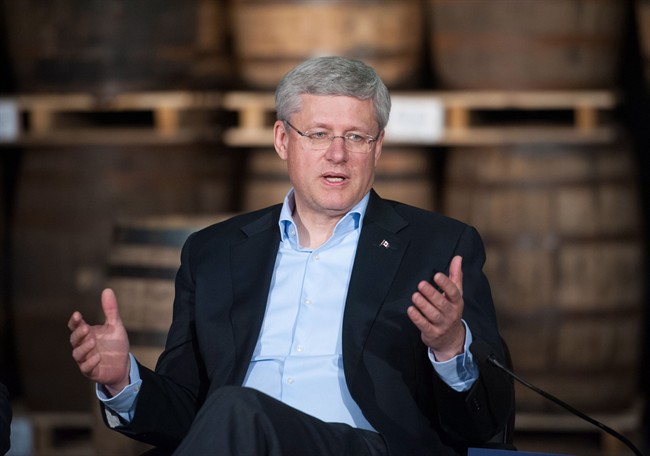UNITED NATIONS, N.Y. – A scan of Canadian speeches at the United Nations General Assembly reveals a shift in priorities during the years of the Harper government, as the prime minister travels to New York this week to address the body for the first time since 2010.

Maternal health: in. Climate change: out.
Those are two of the trends that emerge from a year-by-year comparison of the text of speeches delivered to the international forum since Prime Minister Stephen Harper entered office in 2006.
READ MORE: Climate change one of many ‘significant challenges’ for Canada: Harper
Women’s issues began appearing in the Canadian speeches in 2010, and they’ve been mentioned 13 times since, according to the prepared texts. It’s been the opposite for climate change: it came up 18 times in three years, until 2010. It hasn’t been mentioned since. Iran and the economy have also become a recurring theme since 2008, while Afghanistan, which came up 20 times in Harper’s first UN speech, now gets a token mention every couple of years.
On Monday, the prime minister himself spoke of his New York visit as a matter of juggling priorities.
“Every year, when we go to New York this particular week – and obviously part of it which we we spend at the United Nations – we’re seized with any number of significant challenges that are before us,” Harper said.
“This year, we have new and emerging peace and security threats that range from the form of terrorist organizations to major countries, in the case of the threat against Ukraine; we have challenges of development, humanitarian aid, pandemics; we have challenges of human rights and governance; we have trade issues and the economy; and obviously, I try and touch on a number of these, including climate change.”
WATCH: World leaders gathering at UN to form ISIS strategy
He’d been asked about one particular choice: missing the UN climate conference during his three-day trip to the Big Apple. The leaders of China, India and Germany won’t be there, either. But Environment Minister Leona Aglukkaq will be there representing Canada at the event, which is being attended by Britain’s David Cameron and U.S. President Barack Obama.
Harper will attend a climate-change discussion dinner with UN Secretary-General Ban Ki-moon when he arrives in New York later Tuesday. The next day, he’ll participate in a question-and-answer session with business leaders, and on Thursday he’ll attend an event on women’s health with the secretary-general, before concluding the trip with a speech to the assembly.
World leaders have been asked to bring bold pledges to the climate summit, in an effort to build momentum for a post-Kyoto international treaty. On Monday, Aglukkaq announced the Canada would match vehicle standards already introduced by the U.S.
- Posters promoting ‘Steal From Loblaws Day’ are circulating. How did we get here?
- Video shows Ontario police sharing Trudeau’s location with protester, investigation launched
- Canadian food banks are on the brink: ‘This is not a sustainable situation’
- Solar eclipse eye damage: More than 160 cases reported in Ontario, Quebec
The government’s legion of environmentalist critics argue that there’s no way Canada will ever meet its greenhouse-gas reduction targets without regulating the country’s highest-emitting sector: the oil and gas industry.
“(The auto standards are) just more bafflegab from a do-nothing government,” said John Bennett of Canada’s Sierra Club.
“Now, if Canada actually had regulations like what’s coming in in the United States that would be great, and we’d say that. But we don’t actually have anything like that. We just have a fog machine of perpetual hollow announcements.”
The U.S. recently promised new rules for its biggest polluter – aging power plants. That task was made easier, however, by economic forces at play in the U.S., where coal plants are facing a squeeze from an abundance of lower-cost, lower-emitting natural gas.
READ MORE: Global marches draw attention to climate change
Some prominent people are discussing Canadian oil in New York this week. Their plan is to undermine the industry.
The $860-million Rockefeller brothers charitable fund, created from a family oil fortune, has announced it will dump its fossil-fuel investments, starting immediately with coal and what it described in a statement as “tar sands.” That brings to an estimated $50 billion the total amount institutional investors around the world have pledged to withdraw from fossil fuels over the next five years.
Some of the news coverage of the Rockefeller announcement said the long-term game plan is to do the same thing to fossil fuels that was done to apartheid South Africa and the tobacco industry: make it an investment pariah.
For all the brickbats from environmentalists, the Harper government is being showered with bouquets from other quarters.
There’s been laudatory coverage in the U.S. lately of Canada’s fiscal record, including a glowing column in the New York Times. And there are kind words in New York for Harper’s commitment to maternal health.
Harper has been instrumental in building financial support for the cause, said David Morley, the president of Unicef Canada. The number of child deaths has fallen by half since Harper put the issue on the agenda at a 2010 G8 meeting in Muskoka, Morley said.
“There’s been a real child-survival revolution,” he said. “We know there are fewer kids dying than ever before… It’s incredible, some of the strides that have been made.”



Comments